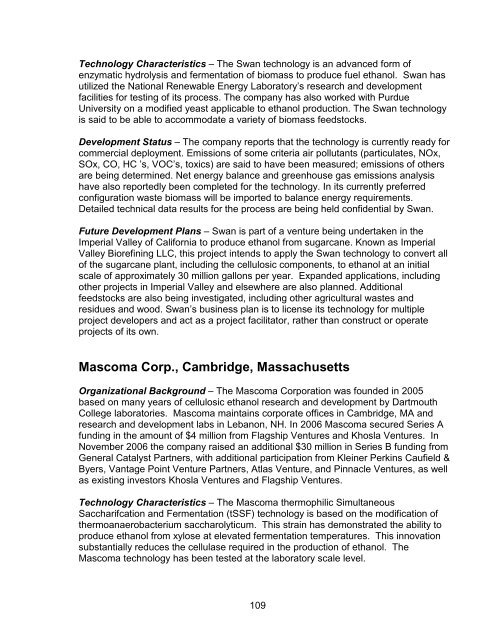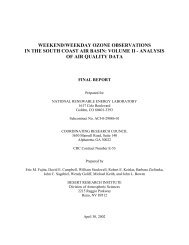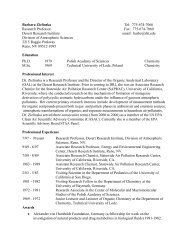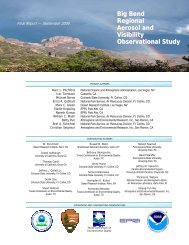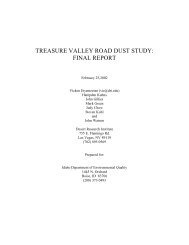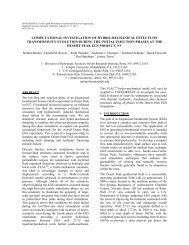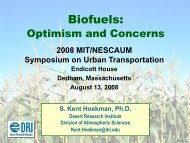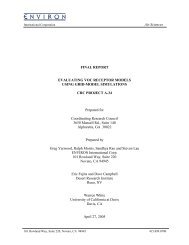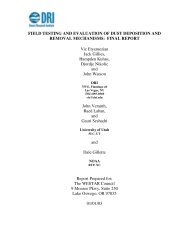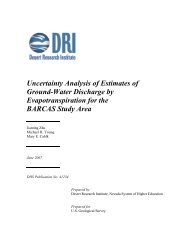Assessment of Conversion Technologies for Bioalcohol Fuel ...
Assessment of Conversion Technologies for Bioalcohol Fuel ...
Assessment of Conversion Technologies for Bioalcohol Fuel ...
Create successful ePaper yourself
Turn your PDF publications into a flip-book with our unique Google optimized e-Paper software.
Technology Characteristics–The Swan technology is an advanced <strong>for</strong>m <strong>of</strong><br />
enzymatic hydrolysis and fermentation <strong>of</strong> biomass to produce fuel ethanol. Swan has<br />
utilized the National Renewable Energy Laboratory’s research and development<br />
facilities <strong>for</strong> testing <strong>of</strong> its process. The company has also worked with Purdue<br />
University on a modified yeast applicable to ethanol production. The Swan technology<br />
is said to be able to accommodate a variety <strong>of</strong> biomass feedstocks.<br />
Development Status–The company reports that the technology is currently ready <strong>for</strong><br />
commercial deployment. Emissions <strong>of</strong> some criteria air pollutants (particulates, NOx,<br />
SOx, CO, HC ’s, VOC’s, toxics) are said to have been measured; emissions <strong>of</strong> others<br />
are being determined. Net energy balance and greenhouse gas emissions analysis<br />
have also reportedly been completed <strong>for</strong> the technology. In its currently preferred<br />
configuration waste biomass will be imported to balance energy requirements.<br />
Detailed technical data results <strong>for</strong> the process are being held confidential by Swan.<br />
Future Development Plans–Swan is part <strong>of</strong> a venture being undertaken in the<br />
Imperial Valley <strong>of</strong> Cali<strong>for</strong>nia to produce ethanol from sugarcane. Known as Imperial<br />
Valley Biorefining LLC, this project intends to apply the Swan technology to convert all<br />
<strong>of</strong> the sugarcane plant, including the cellulosic components, to ethanol at an initial<br />
scale <strong>of</strong> approximately 30 million gallons per year. Expanded applications, including<br />
other projects in Imperial Valley and elsewhere are also planned. Additional<br />
feedstocks are also being investigated, including other agricultural wastes and<br />
residues and wood. Swan’s business plan is to license its technology <strong>for</strong> multiple<br />
project developers and act as a project facilitator, rather than construct or operate<br />
projects <strong>of</strong> its own.<br />
Mascoma Corp., Cambridge, Massachusetts<br />
Organizational Background–The Mascoma Corporation was founded in 2005<br />
based on many years <strong>of</strong> cellulosic ethanol research and development by Dartmouth<br />
College laboratories. Mascoma maintains corporate <strong>of</strong>fices in Cambridge, MA and<br />
research and development labs in Lebanon, NH. In 2006 Mascoma secured Series A<br />
funding in the amount <strong>of</strong> $4 million from Flagship Ventures and Khosla Ventures. In<br />
November 2006 the company raised an additional $30 million in Series B funding from<br />
General Catalyst Partners, with additional participation from Kleiner Perkins Caufield &<br />
Byers, Vantage Point Venture Partners, Atlas Venture, and Pinnacle Ventures, as well<br />
as existing investors Khosla Ventures and Flagship Ventures.<br />
Technology Characteristics–The Mascoma thermophilic Simultaneous<br />
Saccharifcation and Fermentation (tSSF) technology is based on the modification <strong>of</strong><br />
thermoanaerobacterium saccharolyticum. This strain has demonstrated the ability to<br />
produce ethanol from xylose at elevated fermentation temperatures. This innovation<br />
substantially reduces the cellulase required in the production <strong>of</strong> ethanol. The<br />
Mascoma technology has been tested at the laboratory scale level.<br />
109


